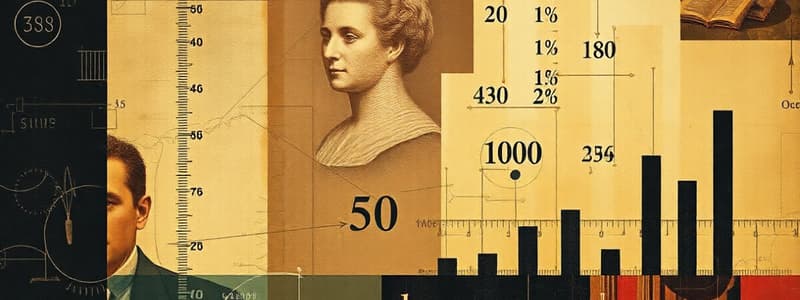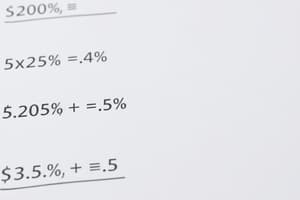Podcast
Questions and Answers
What is the volume of a rectangular prism with dimensions 2 cm, 4 cm, and 5 cm?
What is the volume of a rectangular prism with dimensions 2 cm, 4 cm, and 5 cm?
- 40 cm³ (correct)
- 50 cm³
- 30 cm³
- 60 cm³
Pressure can be calculated by multiplying force and area.
Pressure can be calculated by multiplying force and area.
False (B)
What is the formula for pressure?
What is the formula for pressure?
Pressure = Force ÷ Area
To convert 8 km/h to mph, you multiply by ______ miles.
To convert 8 km/h to mph, you multiply by ______ miles.
If a force of 10 Newtons is applied to an area of 20 cm², what is the pressure produced?
If a force of 10 Newtons is applied to an area of 20 cm², what is the pressure produced?
Define direct proportion.
Define direct proportion.
The formula for y in terms of x when y is in direct proportion to x is y = ______ x.
The formula for y in terms of x when y is in direct proportion to x is y = ______ x.
Match the following conversions:
Match the following conversions:
What is the multiplier to increase an amount by 12%?
What is the multiplier to increase an amount by 12%?
If you increase an amount by 10% and then by another 12%, the overall percentage increase is 122%.
If you increase an amount by 10% and then by another 12%, the overall percentage increase is 122%.
Calculate the density of a piece of metal that weighs 40g and has a volume of 4cm³.
Calculate the density of a piece of metal that weighs 40g and has a volume of 4cm³.
Speed is calculated using the formula __________.
Speed is calculated using the formula __________.
Match the following measurements with their formulas:
Match the following measurements with their formulas:
A block of ice measures 5 cm by 2 cm by 4 cm. What is the volume of the cube?
A block of ice measures 5 cm by 2 cm by 4 cm. What is the volume of the cube?
To find the mass of an object, you can multiply its density by its volume.
To find the mass of an object, you can multiply its density by its volume.
To convert 45 minutes into hours, you would write it as __________.
To convert 45 minutes into hours, you would write it as __________.
What is the equation for y in terms of x when y is proportional to $x^2$?
What is the equation for y in terms of x when y is proportional to $x^2$?
In direct proportion, if one value increases, the other value must increase as well.
In direct proportion, if one value increases, the other value must increase as well.
What is the value of k when x = 4 and y = 25 in an inverse proportion scenario?
What is the value of k when x = 4 and y = 25 in an inverse proportion scenario?
The multiplier in the inverse proportion relationship is represented by _____ .
The multiplier in the inverse proportion relationship is represented by _____ .
Match the following equations with their type of proportion:
Match the following equations with their type of proportion:
When f = 9 and g = 30, how can g be expressed in terms of f?
When f = 9 and g = 30, how can g be expressed in terms of f?
If y and x are inversely proportional, then when x increases, y must also increase.
If y and x are inversely proportional, then when x increases, y must also increase.
If x = 2, find the value of y given that k = 100 and y is inversely proportional to x.
If x = 2, find the value of y given that k = 100 and y is inversely proportional to x.
Flashcards
Pressure
Pressure
The amount of force applied per unit area.
Force
Force
The ability to change the motion of an object.
Volume
Volume
The space occupied by an object.
Density
Density
Signup and view all the flashcards
Direct Proportion
Direct Proportion
Signup and view all the flashcards
Direct Proportion Formula
Direct Proportion Formula
Signup and view all the flashcards
Converting Measurements
Converting Measurements
Signup and view all the flashcards
Speed
Speed
Signup and view all the flashcards
Percentage Increase
Percentage Increase
Signup and view all the flashcards
Multiplier
Multiplier
Signup and view all the flashcards
Overall Percentage Increase
Overall Percentage Increase
Signup and view all the flashcards
Compound Measure
Compound Measure
Signup and view all the flashcards
Mass
Mass
Signup and view all the flashcards
Multiplier in Direct Proportion
Multiplier in Direct Proportion
Signup and view all the flashcards
Inverse Proportion
Inverse Proportion
Signup and view all the flashcards
Inverse Proportion Formula
Inverse Proportion Formula
Signup and view all the flashcards
Multiplier in Inverse Proportion
Multiplier in Inverse Proportion
Signup and view all the flashcards
Writing an Equation in Direct Proportion
Writing an Equation in Direct Proportion
Signup and view all the flashcards
Writing an Equation in Inverse Proportion
Writing an Equation in Inverse Proportion
Signup and view all the flashcards
Study Notes
Repeated Percentages
- To increase a value by 10%, multiply by 1.10
- To increase a value by 12%, multiply by 1.12
- To find the overall percentage increase from multiple percentage increases, multiply the individual multipliers together
Compound Percentages
- Compound Interest: Calculate the future value of an amount that earns interest over time, where the interest is added to the principal each period.
- Formula: Amount x (Multiplier)^Time
- Compound Depreciation: Calculate the future value of an amount that loses value over time, where the depreciation is subtracted from the principal each period.
- Formula: Amount x (Decreasing Multiplier)^Time
Compound Measures
- Compound measures combine two or more units of measurement
- Density: Mass / Volume. Measured in g/cm³, kg/m³ or kg/l
- Speed: Distance / Time. Units include m/s, km/h or mph
- Pressure: Force / Area. Units include N/m² or N/cm²
- Fuel Consumption: Distance / Volume. Units include km/l or mpg
Compound Measure - Speed
- Speed = Distance / Time
- Time = Distance / Speed
- Distance = Speed x Time
- Convert minutes to hours to calculate speed
Compound Measure - Density
- Density = Mass / Volume
- Volume = Mass / Density
- Mass = Density x Volume
- Used to determine how tightly matter is packed within a given volume
Compound Measure - Pressure
- Pressure = Force / Area
- Area = Force / Pressure
- Force = Pressure x Area
- Measured in N/m², N/cm², N/km²
Compound Measure - Converting Measurements
- Conversion factors will vary
- Examples include converting km/h to mph, km/h to km/s, and mph to m/s
What is Direct Proportion?
- Two sets of values are in direct proportion if they have a common multiplier.
- Direct proportion graphs are straight lines that pass through the origin (0,0).
Direct Proportion - without powers
- If y is directly proportional to x, then y = kx, where k is the constant of proportionality (multiplier).
- Find the multiplier (k) by dividing a y value by its corresponding x value.
- Use the multiplier (k) to generate more calculations for the same relationship.
Direct Proportion - with powers
- If y is directly proportional to x², then y = kx².
- If y is directly proportional to x³, then y = kx³.
Inverse Proportion
- Two sets of values are inversely proportional if one value increases while the other decreases at the same rate.
- To write an equation for inverse proportionality: y= k/x where k is the constant of proportionality (k = yx).
Studying That Suits You
Use AI to generate personalized quizzes and flashcards to suit your learning preferences.




